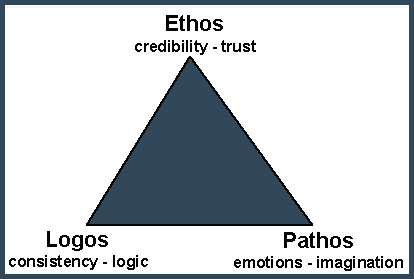Rhetorical Triangle

In this
unit, you will begin to learn how to understand the rhetorical techniques that
speakers use to advance their point of view.
Section A: What is Rhetoric?
Rhetoric is using the tools of
language to shape an argument and make a convincing point.
Aristotle taught that a speaker’s
ability to persuade an audience is based on how well the speaker reaches the
audience through three different areas.
Aristotle
called these three areas modes of
persuasion: logos, pathos, and ethos.
·
Logos: appeal to logic
§ way of persuading an audience through reason
·
Pathos: appeal to emotion
§ Speaker uses vivid ideas and imagery to connect with audience
members
·
Ethos: appeal to character
§ relates to ethics, or the characteristics or behaviors of a
person
Let's Practice: Rhetorical Modes
Section B: Rhetorical Techniques
Rhetorical techniques are used in
written and spoken arguments, but throughout this unit, you will focus on
spoken arguments made through speeches. It is a technique used to evoke
emotions within the reader or audience. Skilled writers use many different
types of rhetorical devices in their work to achieve specific effects. Below are some examples.
|
Rhetorical Techniques |
Description |
|
Idiom |
an expression whose meaning is not predictable from the usual meanings of its constituent elements |
|
Metaphor |
comparison of two dissimilar things by speaking of one in terms of the other-unlike a
simile, a metaphor asserts that one thing is the other thing |
|
Repetition |
a technique in which a sound, word, phrase, or line is repeated for emphasis |
|
Rhetorical question |
a question that is asked to make a point, rather than to
elicit an answer from the audience |
Let’s Practice: Rhetorical Techniques
Section C: Point of View
The point of view is the
perspective or attitude from which a writer or speaker presents information. It
is how a writer or speaker views something, or his or her attitude toward a
topic, subject, issue, or situation. Background knowledge and life experiences can
affect a person’s perspective and attitude or approach to a topic, subject,
issue, or situation. This will influence the content of their writing.
The point of
view is reflected in the words an author chooses and through the tone of the
writing.
In a speech,
the point of view is conveyed in the content of the speech and through the
delivery by the speaker.
Rhetoric is
how speakers use words to express their position or try to advance their point
of view while communicating with an audience.
Let’s Practice: Famous Speech
Louis Gehrig
was a Major League Baseball first baseman for the New York Yankees. He
delivered this speech on July 4, 1939. It serves as a tribute to Gehrig’s
brilliant career and his record of 2,130 consecutive games. At the top of his
game, Gehrig was stricken with the crippling disease that now bears his
name-Lou Gehrig’s disease, also known as ALS.
Read the
speech below then answer the question.
Cite two details from the speech that helped you to determines
his point of view. ANSWER